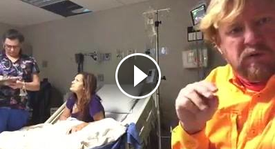Enough is Enough: Deaf Demand Access in Medical Settings
Posted by: Staff Writer on Feb. 19, 2015

Your life is on the line. Or your child is gravely ill. You’re scared. Perhaps you’re in the emergency room or with a surgeon doing a consult. The very last thing you need to worry about is communication.
And yet, far too often this is exactly what happens for Deaf patients and parents of Deaf children in the hospital. They have to deal with communication barriers that could put them in danger, their loved ones in danger, and ultimately cost them their life.
Does that seem like an exaggeration? It’s not. The reasons for the communication barriers in medical settings are myriad and complicated: the doctors office insists providing an interpreter is a financial hardship, hospitals flat out refuse to provide an interpreter, it’s a rural area and interpreters are few and far in between, Video Remote Interpreting is the only ASL-accessible option but it doesn’t meet someone’s critical needs for a live interpreter, the interpreting agency sends an unqualified interpreter, no interpreter is available or isn’t available until hours later, the hospital staff or doctor is untrained and doesn’t know how to secure interpreters or uses inappropriate accommodations instead (pen and paper, using a TTY as accommodation!)… Whatever the reason, the result is the same. Deaf people in medical settings, especially in emergency settings, are often denied legally mandated access.
 Here at deaffriendly.com we hear #deafchallenged medical stories week after week. Case in point, last week alone, there were two different incidents circulating the internet. One was the story of Deaf woman in Tennessee who was denied an interpreter for five days post-surgery. Her roommate recorded the communication challenges she faced for five days and uploaded it to social media channels (watch the video to your left). Then, there was a story in Colorado, where a Deaf father needed an interpreter to have access to his daughters life or death situation. The hospital said they would provide an interpreter in two hours, yet it wasn’t until the next day that an interpreter showed up. The father needed to tell the hospital that his daughter Eva is allergic to penicillin. He wanted to understand the extent of her injuries. And had to know if she would live or die. We see this happen repeatingly - hospitals refusing to step up and provide legally mandated reasonable accommodations for Deaf patients. Enough is enough. Along with Deaf consumers who are fed up and fighting back, we are passionate about seeing this change. Keep your eyes open for more stories, articles and tips on this critical issue in 2015. We won’t be quiet. We’ll be calling out hospitals and doctors publicly for any #deafchallenged reviews on our website.
Here at deaffriendly.com we hear #deafchallenged medical stories week after week. Case in point, last week alone, there were two different incidents circulating the internet. One was the story of Deaf woman in Tennessee who was denied an interpreter for five days post-surgery. Her roommate recorded the communication challenges she faced for five days and uploaded it to social media channels (watch the video to your left). Then, there was a story in Colorado, where a Deaf father needed an interpreter to have access to his daughters life or death situation. The hospital said they would provide an interpreter in two hours, yet it wasn’t until the next day that an interpreter showed up. The father needed to tell the hospital that his daughter Eva is allergic to penicillin. He wanted to understand the extent of her injuries. And had to know if she would live or die. We see this happen repeatingly - hospitals refusing to step up and provide legally mandated reasonable accommodations for Deaf patients. Enough is enough. Along with Deaf consumers who are fed up and fighting back, we are passionate about seeing this change. Keep your eyes open for more stories, articles and tips on this critical issue in 2015. We won’t be quiet. We’ll be calling out hospitals and doctors publicly for any #deafchallenged reviews on our website.
.
Join us in creating a more #deaffriendly world and start speaking out about your #deafchallenged healthcare experience by writing reviews on deaffriendly.com.
Tags
- deaf
- access
- medical
- emergency room
- surgeon
- communication
- hospital
- communication barriers
- doctors
- VRI
- deafchallenged
- pen and paper
- tty
- deaf woman
- Tennessee
- post-surgery
- roommate
- social media
- Colorado
- deaf father
- death
- peicillin
- allergic
- deaf consumers




Comments